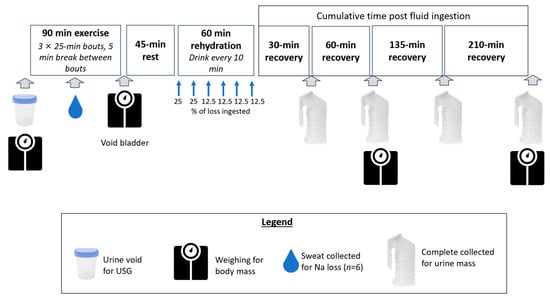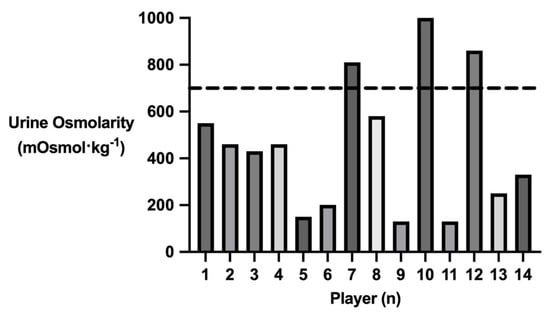Hydration on Performance and Health
A topical collection in Nutrients (ISSN 2072-6643). This collection belongs to the section "Sports Nutrition".
Viewed by 6125
Share This Topical Collection
Editor
 Dr. William M. Adams
Dr. William M. Adams
 Dr. William M. Adams
Dr. William M. Adams
E-Mail
Website
Collection Editor
United States Olympic & Paralympic Committee, Colorado Springs, CO, USA
Interests: fluid regulation; hydration physiology; hydration issues in sports and physical activity; thermal physiology; exertional heat illness
Special Issues, Collections and Topics in MDPI journals
Topical Collection Information
Dear Colleagues,
The purpose of this Collection is to present novel reviews and experimental data regarding hydration and its implication for overall health and performance. In the context of sports and physical activity, proper hydration and nutrition are vital components for the optimization of physical and cognitive performance, and for enhancing health and wellness. Despite extensive work in this area, hydration- and nutrition-related topics in this area remain debated within the scientific literature. There remains to be a thorough understanding of the effect of hydration on performance and health, and of the hydration and nutrition requirements to optimize performance.
In this Collection of Nutrients, we welcome the submission of manuscripts that provide either original research or reviews on the current state of research.
Dr. William M. Adams
Collection Editor
Manuscript Submission Information
Manuscripts should be submitted online at www.mdpi.com by registering and logging in to this website. Once you are registered, click here to go to the submission form. Manuscripts can be submitted until the deadline. All submissions that pass pre-check are peer-reviewed. Accepted papers will be published continuously in the journal (as soon as accepted) and will be listed together on the collection website. Research articles, review articles as well as short communications are invited. For planned papers, a title and short abstract (about 100 words) can be sent to the Editorial Office for announcement on this website.
Submitted manuscripts should not have been published previously, nor be under consideration for publication elsewhere (except conference proceedings papers). All manuscripts are thoroughly refereed through a single-blind peer-review process. A guide for authors and other relevant information for submission of manuscripts is available on the Instructions for Authors page. Nutrients is an international peer-reviewed open access semimonthly journal published by MDPI.
Please visit the Instructions for Authors page before submitting a manuscript.
The Article Processing Charge (APC) for publication in this open access journal is 2900 CHF (Swiss Francs).
Submitted papers should be well formatted and use good English. Authors may use MDPI's
English editing service prior to publication or during author revisions.
Keywords
- water intake
- hydration
- water regulation
- athletic performance
- cognition
- kidney health
Published Papers (2 papers)
2023
Open AccessArticle
Post-Exercise Rehydration in Athletes: Effects of Sodium and Carbohydrate in Commercial Hydration Beverages
by
Nhu Q. Ly, Karrie L. Hamstra-Wright and Craig A. Horswill
Cited by 1 | Viewed by 3297
Abstract
The effects of varying sodium (Na) and carbohydrate (CHO) in oral rehydration solutions (ORS) and sports drinks (SD) for rehydration following exercise are unclear. We compared an ORS and SD for the percent of fluid retained (%FR) following exercise-induced dehydration and hypothesized a
[...] Read more.
The effects of varying sodium (Na) and carbohydrate (CHO) in oral rehydration solutions (ORS) and sports drinks (SD) for rehydration following exercise are unclear. We compared an ORS and SD for the percent of fluid retained (%FR) following exercise-induced dehydration and hypothesized a more complete rehydration for the ORS (45 mmol Na/L and 2.5% CHO) and that the %FR for the ORS and SD (18 mmol Na/L and 6% CHO) would exceed the water placebo (W). A placebo-controlled, randomized, double-blind clinical trial was conducted. To induce 2.6% body mass loss (BML,
p > 0.05 between treatments), 26 athletes performed three 90 min interval training sessions without drinking fluids. Post-exercise, participants replaced 100% of BML and were observed for 3.5 h for the %FR. Mean ± SD for the %FR at 3.5 h was 58.1 ± 12.6% (W), 73.9 ± 10.9% (SD), and 76.9 ± 8.0% (ORS). The %FR for the ORS and SD were similar and greater than the W (
p < 0.05 ANOVA and Tukey HSD). Two-way ANOVA revealed a significant interaction with the ORS having greater suppression of urine production in the first 60 min vs. W (SD did not differ from W). By 3.5 h, the ORS and SD promoted greater rehydration than did W, but the pattern of rehydration early in recovery favored the ORS.
Full article
►▼
Show Figures
Open AccessArticle
Fluid Balance, Sodium Losses and Hydration Practices of Elite Squash Players during Training
by
Ollie Turner, Nigel Mitchell, Alan Ruddock, Alison Purvis and Mayur K. Ranchordas
Viewed by 2317
Abstract
Elite squash players are reported to train indoors at high volumes and intensities throughout a microcycle. This may increase hydration demands, with hypohydration potentially impairing many key performance indicators which characterise elite squash performance. Consequently, the main aim of this study was to
[...] Read more.
Elite squash players are reported to train indoors at high volumes and intensities throughout a microcycle. This may increase hydration demands, with hypohydration potentially impairing many key performance indicators which characterise elite squash performance. Consequently, the main aim of this study was to quantify the sweat rates and sweat [Na
+] of elite squash players throughout a training session, alongside their hydration practices. Fourteen (males = seven; females = seven) elite or world class squash player’s fluid balance, sweat [Na
+] and hydration practices were calculated throughout a training session in moderate environmental conditions (20 ± 0.4 °C; 40.6 ± 1% RH). Rehydration practices were also quantified post-session until the players’ next training session, with some training the same day and some training the following day. Players had a mean fluid balance of −1.22 ± 1.22% throughout the session. Players had a mean sweat rate of 1.11 ± 0.56 L·h
−1, with there being a significant difference between male and female players (
p < 0.05), and a mean sweat (Na+) of 46 ± 12 mmol·L
−1. Players training the following day were able to replace fluid and sodium losses, whereas players training again on the same day were not. These data suggest the variability in players hydration demands and highlight the need to individualise hydration strategies, as well as training prescription, to ensure players with high hydration demands have ample time to optimally rehydrate.
Full article
►▼
Show Figures








